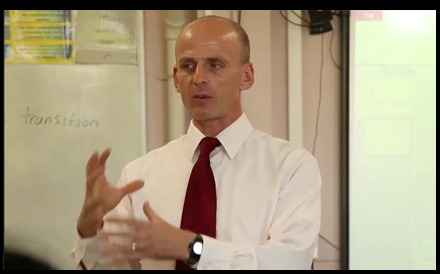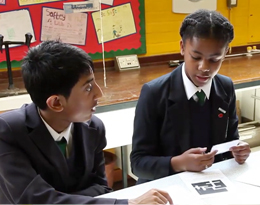Argumentation CPD
This site is for teachers' continuous professional development (CPD) for teaching argumentation in school science.
It is designed for primary and secondary teachers and CPD providers. The ideas and resources on the site can be used by individual teachers, or by groups of teachers trying things out together and reflecting on the outcomes. Sharing and reflecting are good CPD processes.

 Teacher Chris explaining the term 'justification' to his class.
Teacher Chris explaining the term 'justification' to his class.The website is arranged into three units, each focusing on a different aspect of teaching argumentation
-
Structuring and managing groups for small group discussion
Start Unit 1 -
The teacher's role in argumentation activities.
Start Unit 2 -
Designing activities and creating lesson plans
Start Unit 3
How to get the most from this website
Each unit of the website includes CPD tasks with links to film clips, film transcripts, resources and tasks. There is a powerpoint presentation for each unit, if required. The units have been constructed with the intention that they are done in order, as teachers can build their skills through the tasks within the units. However, should CPD providers or teachers wish to use the units in any order, each unit is easily accessible from the home page.
This website is designed to allow for flexible use but for CPD to be effective it takes time, both to complete all the units but also to reflect on what you have been doing and thinking about. Each unit is divided into sections that teach you about using argumentation in science. Within each unit you will find detailed notes, films with associated transcripts and commentaries and links to resources. There are also
suggested tasks and questions that help focus your thinking and development. It makes sense to work through this CDP one unit at a time however, the links between units make it easy to move between them if you prefer.
Why teach argumentation in science?
Teaching school science often involves asking children to accept many ideas without the opportunity to consider why they are believed to be true. The use of argumentation activities provides children with opportunities to take stances justified with evidence, and to evaluate evidence that is used to support or refute different scientific claims. It is important for students to consider why the wrong idea is wrong as well as the justification for the scientific idea. Engaging in argumentation provides children with a better insight into the nature of scientific inquiry and the ways in which scientists work.
Research evidence shows that certain aspects of teaching argumentation are challenging for many teachers of all age
groups. There is a need to produce specific professional development tools that will help teachers to address these challenges, and that will reach a much wider audience of teachers. We have found that there are three key aspects of teaching that would benefit from tasks and video material that can support teachers in such professional development.
These are:
- The planning and organisation of group work.
- The teacher's role in introducing argumentation, sustaining small group discussion and conducting a plenary.
- The design and interpretation of resources within the curriculum.
For professional development to be effective these practices need to be reflected upon analytically and shared between colleagues working together collaboratively.
Many researchers have studied the teaching of argumentation, and readers may have an interest to follow up some key publications in this area to support their understanding of its importance.



